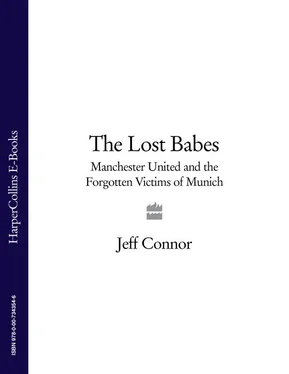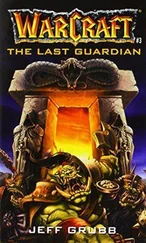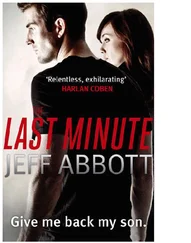‘We played Lincoln in a pre-season game and they had a hard case called Dougie Graham at full-back who was in his thirties and on his way down,’ recalls Scanlon. ‘The ball came down on the edge of the box and as I hit it he hit me and it flew into the top corner and I didn’t know this at the time because I’m laid out. They got the sponge at me, the cold water and capsules of smelling salts and Roger Byrne says to him: “It’s a friendly and they are young lads.” And Dougie says right back: “Until he’s twenty-six he shouldn’t be in the fucking first team.”’
At Old Trafford, too, some of the older players were to rage furiously against the dying of the light, their frustrations exacerbated by increasingly bolder young players who began to show less and less respect for reputation. One incident, late in the 1954 season, was to demonstrate perfectly the growing schism between the United past and its future.
Eddie Lewis, a striker who had been signed as a schoolboy, weighed thirteen-and-a-half stone by the age of seventeen and had scant respect for reputations. Reg Allen, the goalkeeper signed for £12,000 from Queens Park Rangers, was similarly well built. A man who would not go out training until he had his shirt washed and ironed, and his shorts and socks washed, Allen expected respect by right.
Albert Scanlon takes up the story: ‘In the first-team dressing room there was a cabinet on the wall and in that cupboard, a bottle of olive oil, a tin of Vaseline and a jar of Brylcreem, all used by various players for hair grooming. The Brylcreem belonged to Reg Allen and Reg had his own ideas about everything, particularly about Reg. The unwritten rule was that you didn’t touch anything of his.
‘But one day Eddie walks in the first-team dressing room and straight over to the cabinet where he took a dollop of Reg’s Brylcreem. “Fuck Reg!” he says. It took three people, me, Bert Whalley and Bill Inglis to get Reg off Eddie, who by then was going blue, with his tongue coming out. Reg looked at his mark again and walked out. Eddie learned his lesson all right, he never made that mistake again, but there were little things like that going on all the time.’
It was clear the old order was on the way out; swaggering youth on its way in. ‘Bloody kids’ Allen may have christened them, but these bloody kids were perhaps the only young people of any generation, before or since, not to horrify and antagonize their elders. What is more, at an age traditionally one of uncertainty they had already discovered a purpose in life and a means to escape circumstances which, to put it mildly, were far from ideal.
Late in 1959, the researchers for a projected twice-weekly television drama series, based around the characters in a fictional north-west of England street, began to scout locations in and around the cities of Manchester and Salford. In particular, they were looking for a suitable backdrop for the opening credits. These titles, accompanied by a mournful trombone solo and a panned shot of a mangy black cat atop a grimy row of back-to-back terraces would eventually become the most enduring and instantly recognizable in the history of British television. The series makers initially christened the new series Florizel Street , but at the suggestion of a cleaning lady at Granada television studios, who thought that name sounded too much like a detergent, later renamed it Coronation Street .
The Street , before double glazing, Thai brides, drug abuse, kidnapping and murder arrived forty years later, was all urban banality. It offered a composite of grey, gloomy streets, gossipy neighbours, ghettos of close relatives—but oddly in the baby boomers era no children—and an existence that revolved around the local pub. Most viewers outside the city took it as an accurate portrait of inner-city Manchester.
This world of hairnets, curlers, busty barmaids and ceramic ducks above the fireplace did not find total favour with the city’s real-life natives, however, many arguing that few of the characters in the Street possessed the traits that defined Mancunians. The actors, as the script demanded, called a spade a spade all right, and all possessed a deliberate and occasional comical manner of speaking. Some combined that odd mixture of thrift and yet generosity endemic to northerners, but Coronation Street missed one aspect of Manchester in the Fifties and early Sixties entirely: the sense of unity born out of abject, post-war circumstances. The early Street scriptwriters clearly believed that a sense of community equated to pub gossip and affairs with the neighbours. Perhaps they should have examined the real-life model in greater detail.
Archie Street in Ordsall, a few hundred yards from Trafford Wharf and within a mile of Old Trafford football stadium, was the original for those TV credits. Coronation Street , then and now, did not own a celebrity, nor a resident of any status—unless we include the philandering factory owner, Mike Baldwin—but Archie Street possessed both in the cheeky and gifted wing-half of the Busby Babes, Eddie Colman, who was born and spent all his brief life there.
Eddie was brought up by his parents, Dick and Liz, at Number 9, later to become the titular home of the Coronation Street siren Elsie Tanner, and although Archie Street didn’t have a Rover’s Return, there was an off licence, a corner shop which sold everything from newspapers to fire lighters and a church, St Clement’s, on the other side of Ordsall Park. It was from here that an army of small, well-scrubbed boys and girls set out in procession in the first week of every July through the parish on the traditional Whit Walks. In the afternoon, concerts and cricket and football matches entertained the youngsters and when a leather case-ball came out, the undoubted young star of St Clement’s was Eddie Colman.
The Colmans’ only child was nine years old when Germany raised the white flag and the bunting and banners came out in Archie Street. In a scene mirrored throughout Britain on that May day in 1945 the women of Ordsall—most of their men were still away in various theatres of war—rooted out their best floral frocks and pinnies for animpromptu knees-up. There were marches and bands and picnics on hastily erected trestle tables and in nearby Monmouth Street a celebratory bonfire was lit using the wooden legs from redundant household chairs. There were Union Jacks everywhere, fluttering alongside the Stars and Stripes and even the occasional Hammer and Sickle. Portraits of Churchill adorned house windows and V signs were painted on the sooty brick walls of the houses. The dark days were over.
Eddie had been hurried by his parents to a street shelter for much of Christmas 1940 as the Luftwaffe pulverized Salford and its surroundings, the German airmen using the shining length of the River Irwell as a flight path. In the indiscriminate bombing, 9 Archie Street survived intact although just across the Ship Canal incendiaries set ablaze the pavilion and wooden stands of Lancashire County Cricket Club and destroyed Old Trafford Baths on Northumberland Road. One parachute land mine which floated down on to a power station at Trafford Park failed to explode, and was besieged by local children trying to pinch pieces of the silk canopy.
Incredibly, within four days the civil defence and fire services had the 431 major fires in the city under control and Liz Colman’s main complaint when the all-clear sounded was about the film of dirt that had infiltrated her well-scrubbed home.
An ordeal like this merely served to reinforce a bond already made strong by the hardships of existence in Salford in the Forties and Fifties. Like every other house in the neighbourhood, 9 Archie Street did not have a bathroom and Eddie washed standing up in the kitchen sink or, on special occasions, his mother would drag the tin bath in from the hook on which it hung outside. The outside toilet was shared and young Eddie soon learned the timing of the subtle cough that would signal occupancy of the shared loo when approaching footsteps were heard on the cobbles outside.
Читать дальше












